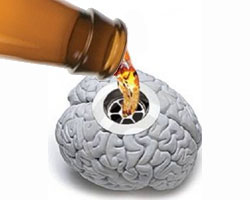Is Alcohol Good for the Heart?

Have you ever heard someone say alcohol is good for your heart or claim that drinking a bit of wine every day is good for your health? Some even claim that alcohol can remove plaque from the blood vessels.
Is there any truth behind these claims and what will be the result if you actually drink small amounts of alcohol every day.
How does alcohol affect our cardiovascular system?
A great number of studies have concluded that moderate consumption of alcohol (1 drink per day) actually has a number of positive effects on the cardiovascular system. 1
This includes:
- Improvement of the lipid profile:
- Increase of the High Density Lipoproteins
- Decrease in Low Density Lipoproteins
- Improves particle size of cholesterol
- Decreases thrombosis:
- Reduces levels of fibrinogen
- Reduces platelet aggregation
- Increases fibrinolysis (dissolving of blood clots )
- Additional mechanisms of action:
- Increases coronary blood flow
- Reduces coronary spasm as a result of stress
- Reduces blood insulin levels and blood pressure
- Increases estrogen levels
- Decreased risk of metabolic syndrome (1-15g of alcohol per day)
Consumption of 1-2 drinks (14-28 grams of pure alcohol) per day reduces the chances of having cardiovascular disease by 30-50% (as shown by Pearson, Thomas A. in "Alcohol and Heart Disease"). Researchers have even taken into account people who are moderate drinkers tend to be healthier overall, have better diet and participate in various sports. Considering these factors, alcohol seemed to produce a positive effect on the cardiovascular system. Additionally, there was no difference between consuming wine, beer, liquor and any other type of alcoholic beverage.
However, it should be noted that people who tend to consume more than two drinks of alcohol per day are at a much greater risk of having a cardiovascular disease, since the graph that shows correlation between alcohol consumption and risk of cardiovascular diseases resembles a “J” curve.
What are other consequences of regular alcohol consumption?
Aside from being good for the heart, alcohol is also good for … absolutely nothing! Now we will discuss a few effects on your body that regular alcohol consumption produces, even if it’s just a single drink per day.
Alcoholism

Psychiatrists and narcologists claim that even small amounts of alcohol (1-2 drinks) can lead to alcoholism if consumed regularly.
At first the effect of alcohol is purely psychological, However, people seem to think that a psychological addiction is somehow less of an addiction than a physical one. On the contrary, it is a psychological addiction that is the hardest to break.
People with first stages of alcoholism don’t have any withdrawal symptoms. They only imagine having a good time if they consume alcohol. Whenever people get together with friends, alcohol is the first thing they think to bring. These people might claim that alcohol helps them to socialize. In reality they have nothing of value to talk about and why they need the help of alcohol to tolerate each other’s company.
By drinking regularly, even small amounts of alcohol, can gradually lead to an addiction. After awhile the person’s tolerance for alcohol rises and small amounts of alcohol do not bring the same satisfaction; and this leads a person to increase the dosage. Large doses of alcohol irreversibly damage many systems in our body, gradually leading to cirrhosis, atrophy of the cortex of the brain, damage to the lining of the gastrointestinal tract and a number of other conditions.
Brain damage

Many people believe drinking just a few drinks on regular basis will not harm the brain. This is not exactly true. While moderate alcohol consumption might not result in serious structural damage to the brain that is often seen in alcoholics (atrophy of the cortex of the brain), alcohol still has a number of effects that affect the psyche of the person.
In medical circles, this condition is known as constricted or restricted affect. Even mild but regular alcohol consumption may lead to this condition.
Restricted affect is characterized by a mild restriction in the intensity and range of displayed feelings. Not only does this cause the person to have trouble communicating with other people, it also leads the person to be drawn toward more primal pleasures (food, sex), and an inability to derive pleasure from something more esthetic (art, literature, self-improvement, etc.). T his is the core reason why alcoholism, even in its mildest forms, is almost incurable. The person simply loses the ability to derive pleasure from anything but the consumption of alcohol, thus making the presence of that person unbearable for people who do not share his addiction.
Conclusion
It appears that alcohol can truly prevent a number of cardiovascular diseases if consumed in moderation (1-2 drinks per day). However, the price for this is too large for any sane person to pay. Even moderate alcohol consumption can result in alcoholism, which in turn leads, not only to an increased chance of heart trouble, but also to a whole range of health problems including gradual deterioration of the mind.
References:
1 Association of Alcohol Consumption with Selected Cardiovascular Disease Outcomes: A Systematic Review and Meta-analysis. Paul E Ronksley, Susan E Brien, Barbara J Turner, Kenneth J Mukamal, William A Ghali BMJ 2011.









